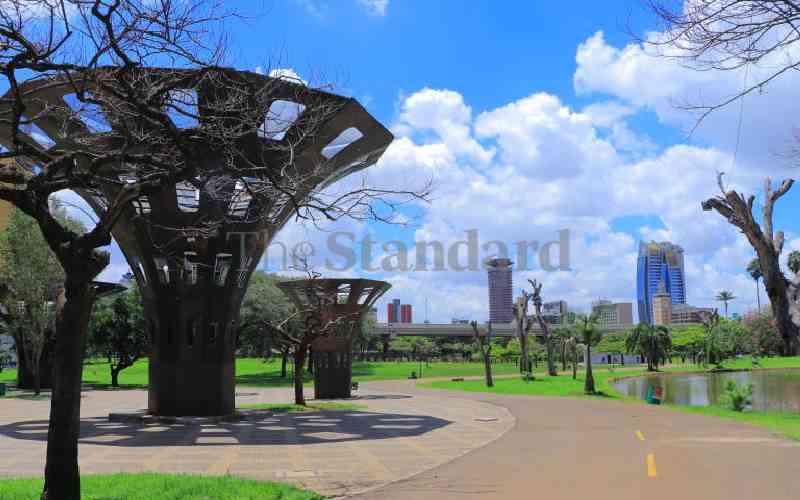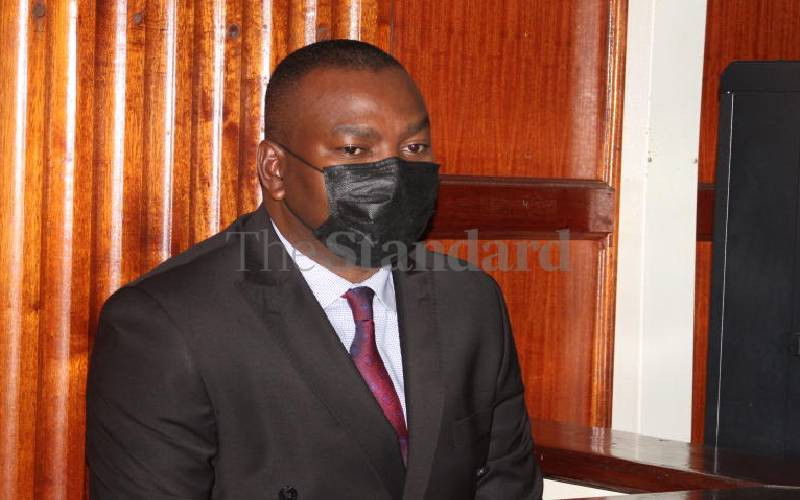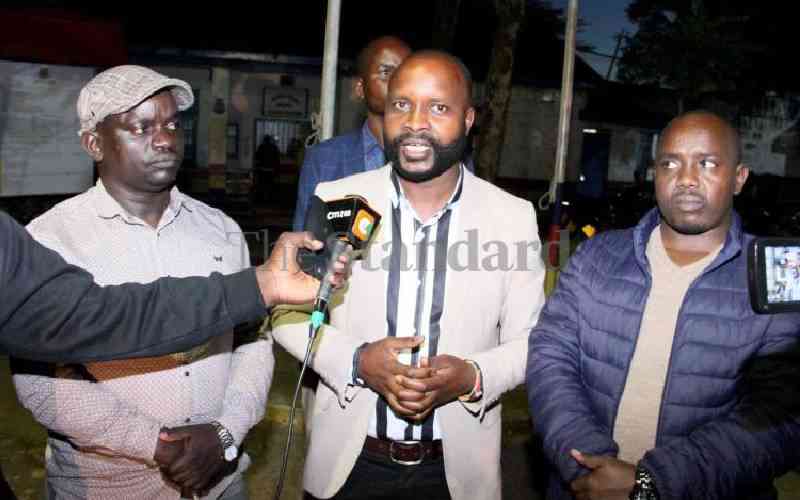By HASSAN HUKA
Tribal politics dominate Marsabit County gubernatorial race as three candidates lock horns in battle for 104,408 votes against backdrop of rampant insecurity and crushing poverty.
Two candidates from the dominant Borana community are competing against the solitary candidate from their Gabra cousins. Moyale MP Mohammed Muhammud Ali (URP) will be fighting it out with Chachu Tadicha who is vying on Kanu ticket and CORD’s Ukur Yattan.
Ali and Tadicha are from the Borana community while Yattan is a Gabra.
As the race enters homestretch, calls for peaceful coexistence has characterised campaign trails to prevent tribal conflict that might be exacerbated by the cut-throat contest. Only a month to the ballot, Marsabit governor candidates are traversing the county to consolidate their votes.
By all means, the governorship race is a tribal contest pitting the Gabra against Borana while other communities residing in Marsabit County such as Rendile, Burji, Turkana and Dasnach will be swaying the balance on whichever side they favour.
Inherent tribal animosity will influence the results of the March 4 elections as loose tribal alliances are formed almost monthly and broken just as fast. One such formation is ReGaBu comprising the Rendile, Gabra, and Burji blocs to clinch the three slots of governor, his deputy, and senator.
However, majority of the Rendile and Burji communities have since bolted out of the union, conveniently to join the Borana side as politics tilt on its tribal axis, once again.
Unbridled insecurity is the major impediment to the development initiatives in Marsabit where tribes fight over livestock, pasture and land. And in a region where tribal districts were created to stop frictions since they could not live as neighbours in one district, their return under one county and the prospect of living harmoniously poses major headache for the first governor and his county government.
The governor will be confronted with the protracted conflict between Gabra and Rendile over grazing land and camel raids along the desert coupled with highway banditry and the incessant killings of innocent pedestrians around Mt Marsabit. But the sibling rivalry, eternal mistrust and sporadic flare-ups between the Borana and Gabra will be hard nut to crack for the governor since the two communities are not keen to share a table.
Market access
The latest fight between the two groups was in Moyale last year when more than 20 people were killed and more than 2,000 families displaced. This is the challenge that all the candidates are promising to solve since peaceful coexistence will win medals for the first governor that bring them together as one people.
Livestock rearing is the economic mainstay of the county but lack of vibrant livestock and animal product market and intense diseases are hampering commercialisation of pastoralism as a way of life.
Further, lack of proper road network is adding to the farmers’?inaccessibility to the livestock markets in Isiolo. These are some of the challenges residents want the devolved government to tackle immediately it is installed.
Across the county, in districts such as Laisamis, Sololo and North Horr, locals demand construction of abattoir to exploit resources, livestock, which contributes 47 per cent of the county council’s revenue annually.
Stay informed. Subscribe to our newsletter
According to Marsabit County Council chairman Roba Elema, the council generates more than Sh80 million annually from the underdeveloped livestock yards in urban centres.?He advises the county government to develop livestock sector to strengthen the county economy.
Though the county is largely a pastoralists zone, the needs of the business community in commercial hubs such as Moyale and Marsabit towns differ sharply with livestock keepers. They want speedy completion of the Moyale-Isiolo highway to facilitate business growth. They urge the national and county governments to work closely with their Ethiopian counterparts to open up the border to enhance 24-hour cross-border trade.
For a Moyale businessman Ali Noor, creation of a 24-hour economy with Ethiopia will be a business breakthrough. He says any candidate that promises to remove restriction on business will earn the traders votes.
Poor connectivity
But it is not the traders alone that will draw benefits according to Noor. Such efforts, he adds, can also boost the accounts of the county government since huge revenue can be generated from the cross-border trade.
The region lacks an inch of tarmac but the hopes are high after the commencement of phase three of the Moyale-Isiolo highway which starts from Marsabit town to Torbi. The next phase (five) will start from Torbi to Moyale. However, other interior areas will remain poorly connected since earth roads are impassable during rainy seasons.
From outside, Marsabit cuts an image of a barren county but its teeming with enormous resources which, if exploited, can generate wealth for the county government.
Areas around mounts Marsabit, Kulal and Hurri hills in the arid north can become food basket if the leadership harnesses the resources well.?The mountainous areas which are highlands in middle of the arid land produces enormous water resources which can be used for irrigation in the lowlands.
Currently most vegetables supplied around Marsabit town, Loyangalani, Kalacha and Maikona in Chalbi desert are produced around the three mountains.
No effort will be spared to turn things around according to aspirant Ali. If elected, he says, his focus will be on infrastructural development and construction of abattoir to add value to livestock business at local level.
Ali, who is campaigning on platform of wealth creation to build a stable county economy and peaceful co-existence, is promising to inject his knowledge of government working to distribute resource equitably across the county.
Though he is seen as a frontrunner in the governor race, the outgoing Moyale MP faces uphill task in his bid against the onslaught by Ukur and Tadicha, who also command sizeable vote blocs.
Reap Benefits
He notes that the rich Rendile and Gabra cultures will be next frontier in resuscitation of the tourism industry in the county. There are two national parks in the Marsabit but tourists have long stopped visiting the area due to poor roads and insecurity.
“We have more than 500km of white sandy beach on Lake Turkana, which, under my stewardship, this county will reap benefits from,” says Ali.
His bid recently received huge boost when group of Rendile, Burji and Gabra leaders endorsed him as the compromise candidate. Ali has picked his running mate from the Burji community, Hassan Marsa, in a move seen as to pacify other communities under his leadership.
Ali and Tadicha will be eating into each other’s support base since they hail from the same tribe. There have been series of talks to implore either to stand down for the other but in vain. Even the efforts of reaching amicable agreement after they sought intervention of the Borana King who resides in Ethiopia failed last year.
Tadicha, an expert in NGO world, promises to employ his knowledge of resource mobilisation to create wealth but his bid has been overshadowed by Ali. Tadicha has identified Abdi Buko, a Moyale tycoon, as his running mate.
He says he will focus on water resource development to ease pressure on few watering points available. This, he believes, will grow local economies by breaking cycle of animal deaths due to lack of water in grazing rangelands.
Being the only Gabra candidate eyeing gubernatorial seat, Ukur Yattan is riding on the solid support of his tribesmen. The immediate former Kenyan envoy to Austria, Yattan is keen to use his wide experience from around the world to uplift the livelihood of residents.
He says he will focus on development of green energy to be used across the county and particularly in fishing industry along Lake Turkana. He intends to establish meat processing plant in the area to add value to local produce.
 The Standard Group Plc is a
multi-media organization with investments in media platforms spanning newspaper
print operations, television, radio broadcasting, digital and online services. The
Standard Group is recognized as a leading multi-media house in Kenya with a key
influence in matters of national and international interest.
The Standard Group Plc is a
multi-media organization with investments in media platforms spanning newspaper
print operations, television, radio broadcasting, digital and online services. The
Standard Group is recognized as a leading multi-media house in Kenya with a key
influence in matters of national and international interest.
 The Standard Group Plc is a
multi-media organization with investments in media platforms spanning newspaper
print operations, television, radio broadcasting, digital and online services. The
Standard Group is recognized as a leading multi-media house in Kenya with a key
influence in matters of national and international interest.
The Standard Group Plc is a
multi-media organization with investments in media platforms spanning newspaper
print operations, television, radio broadcasting, digital and online services. The
Standard Group is recognized as a leading multi-media house in Kenya with a key
influence in matters of national and international interest.








